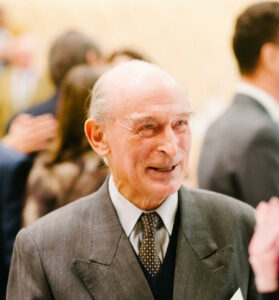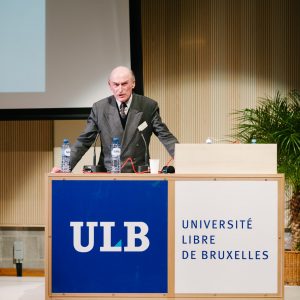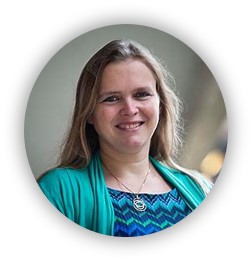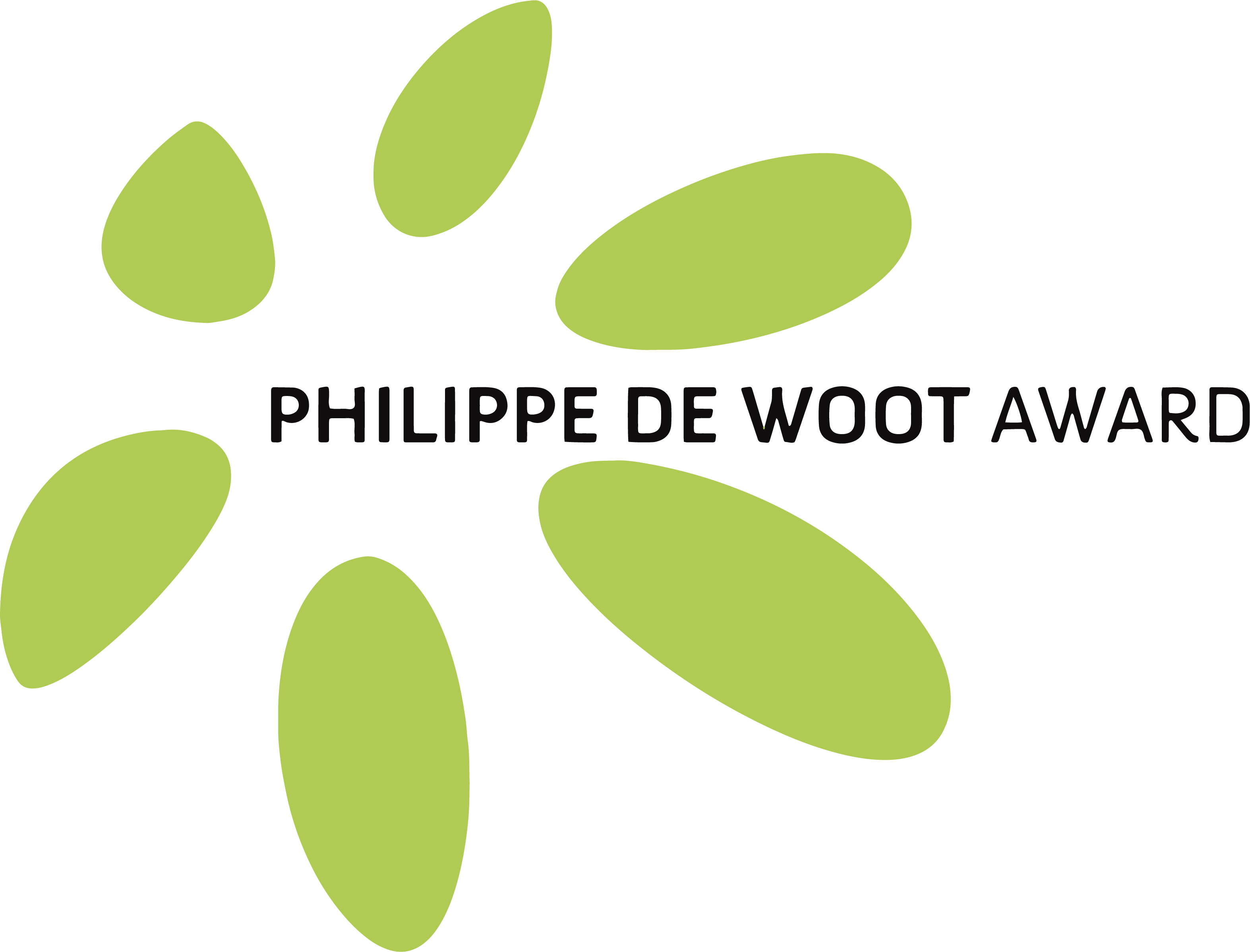Philippe de Woot
Biography

© picture by ULB

Academic activities
- Ordinary professor UCLouvain (1965-1995)
- Visiting professor INSEAD Avira program (1987-2000) and other international university programs
- Fields of research and teaching :
- Enterprise and corporate strategy;
- Change in turbulent environment;
- Enterprise‘s ethics & purpose and their responsibility towards global society.
Professor at the Université catholique de Louvain from 1965 to 1995, Philippe de Woot focuses his research on the firm and analyses the mechanisms of its competitive performance, its capacity for innovation and renewal, and its modes of organization and management. He questions the meaning of progress and the purpose of the firm: economic and technical progress – How? For whom? For what? He contributes to the evolution of the entrepreneurial doctrine insisting on the moral and social requirements of management, by putting ethics back at the centre of corporate strategies, and on raising the dialogue on the Common Good of the planet.
His book, Faut-il enchaîner Prométhée (2005), examines the new responsibilities of companies in the era of globalization and offers a critical analysis of the trend towards Corporate Social Responsibility (CSR). His essay, Rethinking the Enterprise (2013), explores the key role that business can play in transforming the economic system and how it can move from being a problem to being a solution. The company must be a human organization that generates innovation and progress, a place to exercise individual and collective responsibility in the face of ethical and societal challenges.
In 2004, Philippe participated in the creation of a global network of business schools, universities and pioneering companies on 5 continents: The Globally Responsible Leadership Initiative (GRLI), supported by the United Nations Global Compact and the European Foundation for Management Development (EFMD). Philippe advocates for a profound change in the teaching provided by business schools towards training of leaders as value-driven and politically engaged citizens.
In 2010, under the impetus of Charles de Liedekerke, Philippe’s son-in-law, and thanks to the support of private donors and companies, the Philippe de Woot Award was created in order to open up the younger generations to the ethical importance of their future responsibilities.

Institutional achievements
By merging the “ Centre de perfectionnement dans la direction des entreprises” which he was leading with the “Institut des sciences économiques appliquées”, Philippe de Woot created the “Institut d’Administration et de Gestion” (IAG) It later became the “Louvain School of Management” (LSM). This enabled Louvain to reinforce its management and administration disciplines and allowed for the creation of a second cycle “Business School” of international class. The school has been beneficiary of the EQUIS accreditation – an international quality label – since 2004. LSM is today the most renowned Business School in Belgium and has been selected by CEMS as Belgian member of its international network of management schools in each EU country.
In Louvain, over twenty researchers participated directly in these researches. Sixteen PhDs have been achieved and several others are under way. In the European framework, researchers networks have been created and progressively extended in Asia and North America. This empirical research has been made possible thanks to a relentless effort of improvements of the relationship between academia and industry.
Philippe de Woot was a GRLI board member and scientific advisor. In 2004 he participated in the creation of a global network of management schools and enterprises aiming at preparing the global leaders to their new responsibilities.
It is a group of 60 business schools, universities and pioneering enterprises present on the 5 continents, representing over 300.000 students, 1.000.000 employees banding together to promote the development of a new generation of globally responsible leaders.
GRLI (Globally Responsible Leadership Initiative) was co-founded by the UN Global Compact and the EFMD (European foundation for management development). Its mission is to be a catalyst for the development of a new generation of responsible leaders in a global world. To this effect GRLI proposes to re-think the enterprise purpose in function of the major challenges of the 2Ist century, as well as the purpose and role of the universities and management schools.
Jury members and all other people involved in the selection processes promise not to disclose any information to ensure strict confidentiality while processing the application files. The student is advised to inform the concerned stakeholders and obtain their agreement before submitting the application.

© picture by ULB

Advisory activities
- Advisor to the European Commission (1977-1983) with respect to the programmes ESPRIT (Information technology) et FAST (Societal impact of sciences and new technologies).
- Board member or strategy or societal responsibility advisor of a number of national or international enterprises
- Chairman of the Board of Ion Beam Application (1986-2003), a spin off of the researchs of UCL in the fields of cyclotrons. IBA is now the world leader in the field of Proton therapy.
- Board member of The Global Responsible Leadership Initiative (GRLI) in joint-venture with the UN Global Compact
- Founding member and board member of the “Fondation Roi Baudouin”. Created at the 25th anniversary of the reign of the King, this foundation’s purpose is to improve the quality of life in Belgium.
- Chairman of the Fondation Woitrin : urbanism et animation of the new city of Louvain-la-Neuve (from 1985).
- Member of the Board of the Fondation Bernheim 1995-2005

Distinctions
- Doctorate Honoris Causa of Bologna (Italy) 1988
- Zerilli Marimo Award of the Moral and Political Sciences Academy s (Institut de France) 2002, for his entire work
- Fédération des Entreprises de Belgique (FEB) Centennial Award, 1996, for his entire work.
- First Prize of the French Association for Planification for his book “Le métier de dirigeant” with O. Lecerf et Y. Barraux, 1991.
- Manpower Prize of Human Resource book in 2006, for “Faut-il enchaîner Prométhée ?”
- Bekaert Prize for “Pour une doctrine de l’entreprise”, 1968

Bibliography (not exhaustive)
-
La fonction d’entreprise, Louvain Paris ; Nauwelaerts, 1962 (réédition en 1968), 484 p.
-
La funzione dell’impresa, Milano : Franco Angeli, 1968, 415 p.
-
Pour une doctrine de l’entreprise, Paris, Seuil, 1968
-
Stratégie et management, Paris, Dunod économie, 1970
-
Profil de dirigeant, Bruxelles-Paris, 1977
-
Management stratégique des groupes industriels (avec Xavier Desclée), Paris, Economica, 1984
-
Les entreprises de haute technologie et l’Europe, Paris, Economica, 1988, 244 p. (Premier Prix de l’Association française de planification).
-
High Technology Europe, Oxford, Basil Blackwell, 1989
-
Le métier de dirigeant (avec O. Lecerf et J. Barraux) Paris, Ed. de Fallois, 1991
-
Euro-management, A New Style for the global Market (avec R.Calori et H.Bloom), London, Kogan Page, 1994
-
A European Management Model, (Ed. avec R. Calori), Prentice Hall International, 1994
-
Méditation sur le Pouvoir, De Boeck, Louvain la Neuve, 1998
-
Les défis de la globalisation : Babel ou Pentecôte, (Ed. Avec J.Delcourt) Presses Universitaires de Louvain, 2001
-
Responsabilité Sociale de l’Entreprise : Faut-il enchaîner Prométhée ? Paris, Economica, 2005
-
Should Prometheus Be Bound? London, Palgrave Macmillan, 2005 and 2009
-
Lettre ouverte aux décideurs chrétiens en temps d’urgence, Paris, Desclée de Brouwer, 2009
-
Spirituality and Business: A Christian viewpoint, GSE Research Ltd, Leeds, 2013, 102 p.
-
Repenser l’entreprise, Bruxelles, Académie Royale de Belgique, 2013
-
Rethinking the Enterprise, Greenleaf Publishing, 2014
-
L’innovation, moteur de l’économie, Bruxelles, Académie Royale de Belgique, 2014
-
Responsible Innovation, Greenleaf Publishing, 2016
-
Maîtriser le Progrès économique et technique, Académie Royale de Belgique, 2016, 93 p.
-
Les limites à la compétitivité, Groupe de Lisbonne, Paris, La Découverte, 1994 ; translated in English, Italian, dutch, german, spanish and polish. The English edition is titled “Limits to Competition”, MIT Press, Cambridge, Mass., en 1995, 170 pp.
-
Stratégies d’entreprise et globalisation in « Dictionnaire de la stratégie », Th. de Montbrial, éd., 2000, Presses Universitaires de France, Paris.
-
Managing Change at the University, in Innovative University Management, Genève, Association des Universités Européennes, 1995.
-
Transforming Organizations, Sinatra Ed., Dordrecht, London, Boston, Kluwer Academic Publishers, 1997, 538 pp.
-
University: Strategies for Progress, Barcelona, Universidad Politecnica de Catalunya, 1998.
-
Ambiguïtés de la globalisation, in Globalisation et société multiculturelle, S. Urban, éd., 2000, Presses Universitaires de France, Paris, pp 155-170
-
L’entreprise européenne responsable face à la globalisation, in Regards croisés sur l’Europe, Académie des sciences morales et politiques, Presses Universitaires de France, Paris, 2005
-
Globally Responsible Leadership Initiative: A call for Action, EFMD and Global Compact, Brussels, 2005, 48 pp


Tribute to Philippe de Woot
To discover professor Valérie Swaen’s tribute to Philippe de Woot (2016),

Other testimonials
« I only met Philippe de Woot once in the academic year 2011/12. He took the time to see me as a newly recruited member of the LSM. I was impressed to see a Professor Emeritus who was so concerned about what was going wrong in the global economy and about changing the purpose of business organizations. Philippe put all his energy every day of his life to make a contribution to ‘society’ and he was convinced that dialogue between academics and practitioners as well as questioning of practice by academics is needed to ultimately lead to change for more responsible business practices. He pioneered on Global Responsible Leadership and has inspired and helped me to write about the topic. »
« If I chose him for my thesis committee, it is because he made me benefit from his analytical academic spirit, his passion for knowledge open to the world, a means of development and transcendence of the human being »
« Philippe inspired me a lot first as a professor who managed to teach science, art and management practice simultaneously. Then as a colleague, a true intellectual who always raised the debate to bring out the collective intelligence. Finally, in a very practical way, his vision of entrepreneurship has guided me in my own entrepreneurial journey. »
« In our field of Strategy and Organization at LSM, we have a little joke among ourselves: « If you’re looking for a new idea, go look in Philippe’s old books! Philippe de Woot is undoubtedly one of the founding fathers in Europe of Corporate Strategy, which used to be called Corporate Policy, and he participated in the creation of the Strategic Management Society, the most important academic society in the field. Much could be said about his influence on our scientific community, but also on managers and, of course, on students. I will limit myself here to one aspect, namely his obsession with the quest for meaning. The action and responsibility ofleaders, for him, was economically oriented, of course, but could not be separated from a broader ambition, based on attention to others and concern for improving collective well-being. Today, many researchers emphasize in managerial decisions the importance of the relationship with others, « care » to use an American term. This is a new idea that can already be found in the writings ofPhilippe de Woot from the 1980s and 1990s. « If you are looking for a new idea, go and look in Philippe’s old books… »
« I met Philippe de Woot in the framework of the courses organized by the Louvain School of Management on corporate social responsibility (with V. Swaen & J. Noterdaeme) and the Research Fund for Corporate Doctrine (with Claude Champaud & Alexia Autenne). Beyond his immense talents as a pedagogue (emotional transmission of values and knowledge) and as a researcher (freedom, erudition, curiosity and imagination), I was struck by his cordial simplicity (« Hello Professor de Woot – Hello Yves; my name is Philippe »), his benevolent finesse of mind (he understood by half a word and valued what we were trying – sometimes awkwardly – to express), his discreet elegance (physical and moral, what a panache! ), his jubilant humor (under an austere appearance, he revealed himself – with a twinkle in his eye – as a fabulous teller of jokes) and his generous empathy (an ardent defender of entrepreneurial humanism, he practiced « conversion through outreach »). A committed, exquisite and subtle man, he embodied with rigor and vigor – without bursting his voice or using his sleeve – the values inspired by his deep nature and his Christian faith. I remember this sentence pronounced by the celebrant during the funeral: « If Philippe is not in heaven, heaven does not exist! « . Whatever their convictions, those who knew Philippe agree that he was a divine being, a delightful man »
« Philippe de Woot knew how to mix elegance and depth, distinction and generosity. He was one of those, quite rare today, who did not renounce either the love of letters, or the economic analysis, or the criticism of a system that innovates as much as it excludes. When a man of this quality disappears, we say to ourselves that the world will miss him. But we immediately understand that his message remains, precise and inspiring. It remains to be seen what echoes of it will be in society and in the university. Transforming the economy for a more just and less violent world: the path traced by Philippe de Woot is a path to the future. How can we not express our gratitude to him? »
« A very present emeritus figure at the Louvain School of Management, Professor de Woot embodied for the following generations of professors the ideal of the free and committed thinker, the wise man who combines humanism and intellectual rigor. By tirelessly questioning the very purpose of business, he has, more than any other, written business ethics into the DNA of our school. Professing responsible management in the service of society was not only his profession but his life’s work. There is no doubt that his inspirational spirit will continue to inspire us. «
« At the crossroads. I have had the privilege of crossing paths with Philippe de Woot both in my professional life, through our common quest for a more responsible economy, and on my personal path, as a neighbor and friend. On many occasions, his enlightened spirit has guided, challenged and enriched me. For hours on end, by the ponds of Tervuren, we discussed the meaning of enterprise, the role of leadership, ethics and politics, finances, religion and spirituality, children and grandchildren, migratory birds, and a thousand other topics. At the next crossroads, I will now be alone, without a guide, but confident to continue on the path we have traced together and to continue his teaching and advocacy for a more responsible and sustainable future. »
« I first met Philippe de Woot when I was hired as a researcher at the IAG in 1994, upon my return from the United States. I knew him then only by reputation, having never had a class with him. I was introduced to him in the hallway of what was then called the Policy and Business Economics Unit. I was immediately struck by his great kindness and his immense erudition. Yet Philippe did not try to impose. He was genuinely interested in others, whether they were young researchers or assistants. I think it was this genuine interest in others that led Philippe to become passionate about business, not about the company as a black box, but about the human being at the center of the organization. His humanistic vision of the entrepreneur has left its mark on generations of students and researchers who today study these boxes or find themselves at the center of them and adorn them with colors that make them less black. »
« When I was a student at LSM, Pr. Em. Philippe de Woot acquainted me with the fascinating topics ofresponsible entrepreneurship, ethical business strategy and strategic corporate social responsibility. He encouraged me to start a master thesis in this field, which I did. Thank you, Mr. de Woot for your catching enthusiasm and for calling such crucial topics in academia and businesses to mind. »
« I never had the chance to have Philippe de Woot as a professor when I was still a student at Louvain-la-Neuve. Philippe de Woot had been granted emeritus a few years earlier. Nevertheless, his book « Faut-il enchaîner Prométhée » (Should we chain Prometheus?) was on the syllabus of one of my last master’s courses at UCL, when the question of the meaning and direction I wished to give to my professional future was insistingly raised. Philippe de Woot’s reflections and positions on the raison d’être of entrepreneurial activity – at the heart of this book and, more broadly, of his work and commitment – nurtured and strengthened my aspirations at the time, as they did those of many students of previous generations who had attended UCL. Subsequently, during my doctoral research on issues linking corporate social responsibility and strategic and organizational change, Philippe de Woot actively supported and advised me with the finesse of mind, benevolence and enthusiasm characteristic of those for whom both convictions and knowledge are in vain if one neglects to transmit them and bring them to life. Philippe de Woot, with his capacity for indignation and questioning of the status quo, combined with a solid commitment and an optimism that is rarely undermined, embodied a form of exemplarity. Today, we must certainly and ardently hope that he continues to represent a source of inspiration for many of us. »(François Maon, IESEG School of Management).
« My understanding and perception of Corporate (Social) Responsibility have developed by following Philippe de WOOT’s pertinent reflections over the last twelve years. It is thanks to his anticipatory vision of the societal stakes and risks for companies, to his teachings imbued with great wisdom and an equally enlightening sagacity that I have been able to develop (with internal and external stakeholders) a strategy and multiple CSR initiatives within the ENGIE Group (at the time SUEZ, then GDF SUEZ). Philippe de WOOT proved to be a reliable guide for my colleagues and myself, constantly looking for social innovation. Two qualities that are highly appreciated in a company. Moreover, the fact that he has been an inexhaustible source of inspiration for new generations of managers has always been a source of great satisfaction to me, well aware as I am of our moral duty to develop a more united, more sustainable and more equitable society. Thank you to Philippe de WOOT for all this. »
« What always struck me in Philippe De Woot is his capacity–even at high age–to talk to young people that lived in such a different world and yet fell silent and listened, just like I had done when I was a student. Often he talked about the leader as one who inspires because she or he has a vision, who points to a future instead of being driven by the past, who is able to communicate because she or he speaks with the hart. He was all that. In a university driven by knowledge transfer, he gave meaning to this knowledge. This is undoubtedly the reason why he was respected and revered by so many people. »
« In September 1995, I joined the General Policy Unit of the IAG (now the Louvain School of Management) as a young assistant under the leadership of Philippe de Woot. I was passionate about change in organizations and Philippe said to me one day: « Alain, we have a unique case in the world and nobody is interested in it! If this large Belgian company were a patient, all the doctors in the world would be jostling to come and study it closely! It all started from there, from this unforgettable exchange that triggered a doctoral thesis on the speed ofchange propagation within large organizations. Philippe opened the doors to a unique and fascinating empirical field for me. I owe him a lot. Thank you Philippe! «
